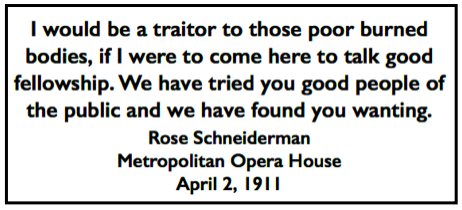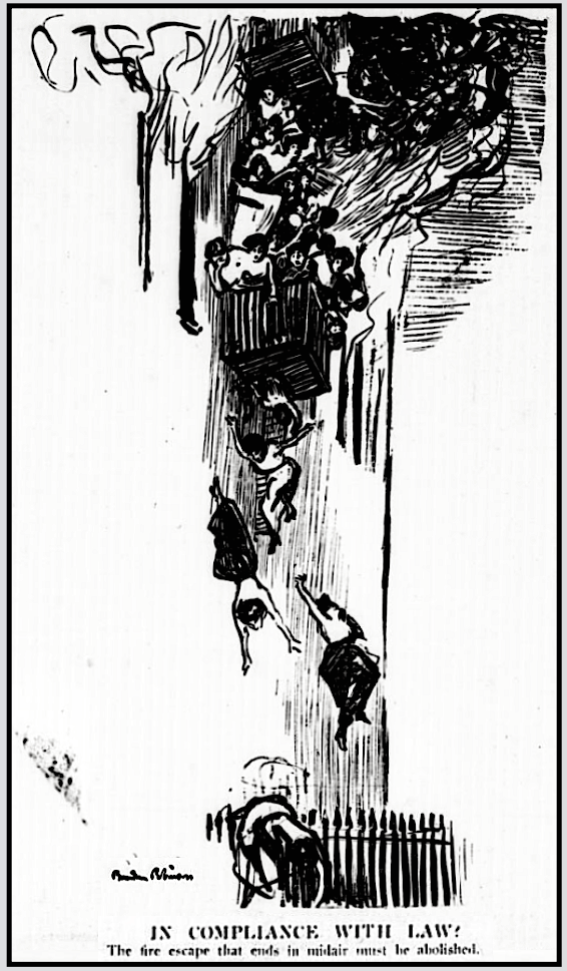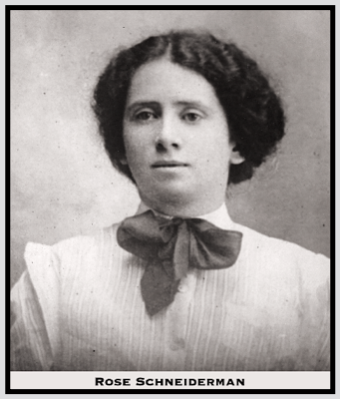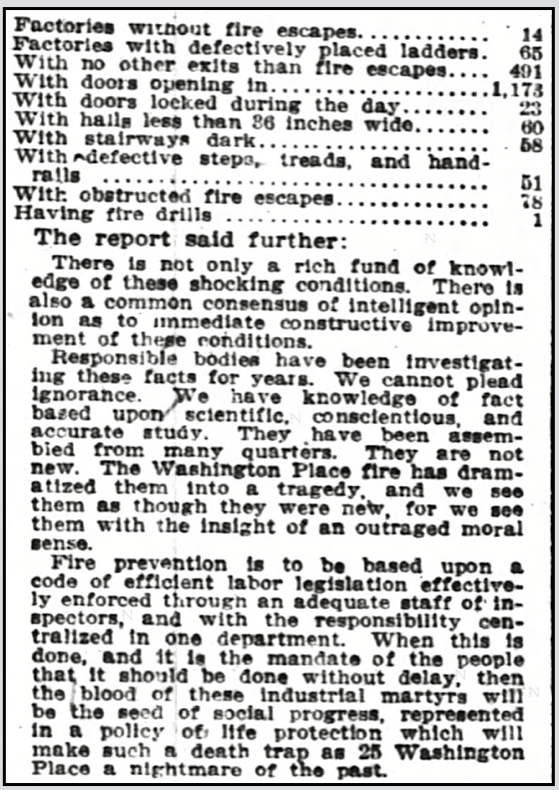 ———-
———-
Hellraisers Journal – Tuesday April 4, 1911
New York, New York – Rose Schneiderman Speaks at Metropolitan Opera House
From The New York Times of April 3, 1911:
MASS MEETING CALLS FOR NEW FIRE LAWS
———-
Metropolitan Opera House Gathering Decides to
Name a Standing Committee on Protection.
———-WORKERS NOT IN ACCORD
———-
Woman Union Leader Says They Have Lost Faith
In the Public and Must Rely on Themselves.
———-
More people went to the Metropolitan Opera House yesterday to participate in the council on the Asch Building fire disaster than could find seats in the grand tier, where the boxes were reserved, or in the orchestra and galleries, where they were open to all. Those in the grand tier came in automobiles, and were admitted at a special side entrance opened thirty minutes before the other doors. Those in the orchestra floor for the main part were from the upper west side, while the east siders overflowed one gallery after another until they had packed the house.
The meeting, which lasted from 3 o’clock until 5:20, proved to be more cosmopolitan than harmonious. The men in the upper galleries, instead of applauding the programme brought forward by the leaders to obtain better fire protection laws, reserved their loudest cheers for those who dissented from the programme, on the ground that citizens’ committees were incapable of doing any real good and had always proved a failure.
The outcome of the meeting was the adoption of resolutions by a partial vote calling for the creation of a permanent committee to advocate new legislation and see that there is no official neglect to enforce such laws as now exist.
The dissenters from this programme held that there would be no improvement for the working classes until in class solidarity they demanded it at the polls and through committees of their own. They advocated the organization of working people into Assembly district committees and the giving of fire inspectorship privileges to labor union officials.
The Speakers Interrupted.
Every little while from the topmost gallery shouts from Socialists interrupted the speakers, and once the meeting got away from the Chairman’s control while those upstairs cheered for the interrupters and those below attempted to hiss them down. There was one moment when feeling grew tense to a snapping point, and the audience was held too closely by the speaker’s words to interrupt or applaud as the girl who had been speaking went back up the stage to her seat.
Rose Schneiderman, who led the workers out of the Triangle factory in their strike two years ago and bailed them out after being arrested, found words difficult when she tried to speak. She stood silent for a moment, and then began to speak hardly above a whisper. But the silence was such that everywhere they carried clearly……
[After she had gained possession of her voice,
Miss Schneiderman began:]I would be a traitor to those poor burned bodies, if I were to come here to talk good fellowship. We have tried you good people of the public and we have found you wanting. The old Inquisition had its rack and its thumbscrews and its instruments of torture with iron teeth. We know what these things are to-day; the iron teeth are our necessities, the thumbscrews are the high-powered and swift machinery close to which we must work, and the rack is here in the firetrap structures that will destroy us the minute they catch fire.
This is not the first time girls have been burned alive in this city. Every week I must learn of the untimely death of one of my sister workers. Every year thousands of us are maimed. The life of men and women is so cheap and property is so sacred. There are so many of us for one job, it matters little if 143 of us are burned to death.
We have tried you, citizens; we are trying you now, and you have a couple of dollars for the sorrowing mothers and brothers and sisters by way of a charity gift. But every time the workers come out in the only way they know to protest against conditions which are unbearable the strong hand of the law is allowed to press down heavily upon us.
Public officials have only words of warning for us—warning that we must be intensely orderly and must be intensely peaceable, and they have the workhouse just back of all their warnings. The strong hand of the law beats us back when we rise into the conditions that make life unbearable.
The Worker’s View of It.
I can’t talk fellowship to you who are gathered here. Too much blood has been spilled. I know from experience it is up to the working people to save themselves. The only way they can save themselves is by a strong working-class movement.
The Chairman, Mr. [Eugene] Philbin, after Miss Schneiderman had concluded and the audience was beginning to find voice in gallery calls, took occasion to pledge to all present that the Citizens’ Committee, regardless of past failures of such committees, would this time work aggressively, and in earnest.
On the stage, which had been filled with chairs to take care of as many as possible of those who could not find seats in the main auditorium, Mr. [Jacob H.] Schiff sat between Mrs. Belmont and Peter Brady a printer from Brooklyn, who had been invited to be present as a representative of organized labor. Miss Anne Morgan had taken the Opera House on behalf of a committee of fifty of the Women’s Trade Union League.
[…..]
Conditions in Factories.
Dr. Henry Moscowitz of the Joint Board of Sanitary Control for the suit and cloak trade, submitted a report showing results in an investigation of 1,200 factories, comparing it with reports sent in to the Women’s Trade Union League, and published in THE TIMES yesterday. In the 1,200 factories whose conditions had been verified by the board these conditions were found:
[…..]
Peter Brady, the Brooklyn printer, said that between capitalistic greed and official incompetence he expected the efforts of any citizens’ committee to come to naught, and advocated that the laborers take the law into their own hands and refuse to work wherever conditions were not what they should be.
[…..]
[Note: nevertheless, a Resolution to establish a Citizen’s Committee of Five was passed.}
Chairman Philbin said that he would announce the names of the committee called for in the resolution some time this week.
[Emphasis, drawing and photograph added.]
Note: other speakers included Jacob H. Schiff, Bishop Greer, Eugene Philbin, and Rabbi Stephen S. Wise, “all of whom had advocated a permanent citizens’ committee on fire protection.”
~~~~~~~~~~~~~~~~~~~~~~
SOURCE
The New York Times
(New York, New York)
-Apr 3, 1911
https://www.newspapers.com/image/20296302/
IMAGES
Triangle Fire, “Compliance” by Boardman Robinson,
NY Tribune, p1, Mar 28, 1911
https://chroniclingamerica.loc.gov/lccn/sn83030214/1911-03-28/ed-1/seq-1/
Rose Schneiderman, LoC
https://www.loc.gov/item/mnwp000051/
Rose Schneiderman VP NY WTUL,
Chicago Union Labor Advocate, p26, Jan 1909
https://play.google.com/books/reader?id=WB6l6ahRP6UC&printsec=frontcover&pg=GBS.PA26
See also:
Tag: Triangle Shirtwaist Factory Fire
https://weneverforget.org/tag/triangle-shirtwaist-factory-fire/
Apr 3, 1911, New York Times-At Met Opera House re Triangle Fire, Rose S: “We Have Found You Wanting”
https://www.newspapers.com/clip/75017407/apr-3-1911-new-york-times-at-met/
~~~~~~~~~~~~~~~~~~~~~~~~~~~~~~~~~~~~~
Ballad of the Triangle Fire / Bread and Roses
– Dora Wasserman Yiddish Theatre



